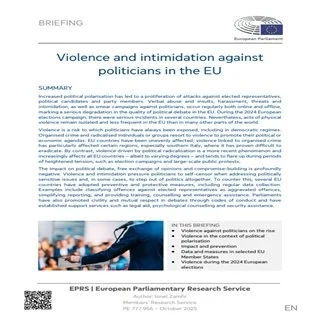By Lonel Zamfir
Increased political polarisation has led to a proliferation of attacks against elected representatives, political candidates and party members. Verbal abuse and insults, harassment, threats and intimidation, as well as smear campaigns against politicians, occur regularly both online and offline, marking a serious degradation in the quality of political debate in the EU. During the 2024 European elections campaign, there were serious incidents in several countries. Nevertheless, acts of physical violence remain isolated and less frequent in the EU than in many other parts of the world. Violence is a risk to which politicians have always been exposed, including in democratic regimes. Organised crime and radicalised individuals or groups resort to violence to promote their political or economic agendas. EU countries have been unevenly affected; violence linked to organised crime has particularly affected certain regions, especially southern Italy, where it has proven difficult to eradicate. By contrast, violence driven by political radicalisation is a more recent phenomenon and increasingly affects all EU countries – albeit to varying degrees – and tends to flare up during periods of heightened tension, such as election campaigns and large-scale public protests. The impact on political debate, free exchange of opinions and compromise-building is profoundly negative. Violence and intimidation pressure politicians to self-censor when addressing politically sensitive issues and, in some cases, to step out of politics altogether. To counter this, several EU countries have adopted preventive and protective measures, including regular data collection. Examples include classifying offences against elected representatives as aggravated offences, simplifying reporting, and providing training, counselling and emergency assistance. Parliaments have also promoted civility and mutual respect in debates through codes of conduct and have established support services such as legal aid
Brussels: EPRS | European Parliamentary Research Service, 20252025. 11p.





